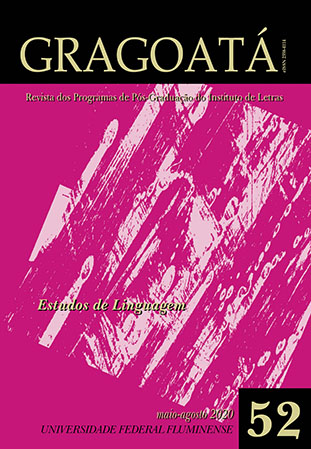Lexical compression: notes about a semantic-historical-constructive model for analysis of derived vocabules
DOI:
https://doi.org/10.22409/gragoata.v25i52.40851Keywords:
Morfolexical semantics. Derivation. Construction Grammar. Lexical compression.Abstract
In this article, we will discuss lexical compression, also known as micronarrative, a path of analytical appreciation for the content of derived words, integrated into the theoretical framework of the Construction Grammar. In this model, there is a perception of derived words as capsules of compressed semantic-lexical content; thus, for example, in a word like doleira, a complex of information would be compressed which, when stretched, would mean something like ‘(i) small bag attached to the front (of one’s body), usually with a single compartment, used under clothes – especially by tourists – , as a precaution against theft of banknotes (dollars, euros, etc.), credit cards, passports or other essential goods when traveling or commuting from one place to another; (ii) a woman who trades US dollars in the parallel market’. It is an analitical proposal originated from readings and adaptations to the lexicon of Turner's lessons (1996) on the literary mind, initially applied by Botelho (2004), Santos (2005) and Carmo (2005) to the description of suffixed products in the contemporaneous Portuguese. Based on such works, Lopes (2016a, 2016b) applied for the first time the above-mentioned theoretical model for the historical-diachronic unraveling of the semantics of prefixed words – in an intercrossing between Etymology, Historical Morphology and the Construction Grammar –, following to this, there were some other studies (SIMÕES NETO, 2016; SOLEDADE; SIMÕES NETO; LOPES, 2017; LOPES, 2018), which presented more improved applications and contributions. Through revisitation to these and other works, we will outline the main topics that characterize lexical compression, presenting some examples of its application to language facts in its diachronic trajectory from Latin to archaic and modern Portuguese.
Downloads
Downloads
Published
How to Cite
Issue
Section
License
Authors who publish in Gragoatá agree to the following terms:
The authors retain the rights and give the journal the right to the first publication, simultaneously subject to a Creative Commons license CC-BY-NC 4.0, which allows sharing by third parties with due mention to the author and the first publication by Gragoatá.
Authors may enter into additional and separate contractual arrangements for the non-exclusive distribution of the published version of the work (for example, posting it in an institutional repository or publishing it in a book), with recognition of its initial publication in Gragoatá.

Gragoatá is licensed under a Creative Commons - Attribution-NonCommercial 4.0 International.














